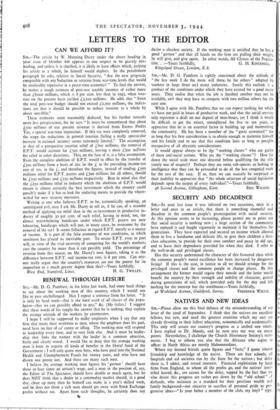Sin,—Mr. D. G. Pumfrett is rightly concerned about the attitude
of " the less work I do the more will there. be for others " adopted by workers in large firms and many industries. Surely this outlook is a product of the conditions under which they have existed for a good many years. They realise that when the job is finished another may not be available, and they may have to compete with two million others for the next one.
While I agree with Mr. Pumfrett that we can expect nothing for which we have not paid in hours of productive work, and that the social services only represent a draft on our deposit of man-hours, yet I think it would be difficult to get the miner, unemployed for five to ten years, to appreciate that he is an essential factor in building up and maintaining the community. He has been a member of the " great unwanted " for so long that his first consideration is to obtain enough to maintain himself and his family and to see that this condition lasts as long as possible irrespective of all altruistic considerations.
It would• appear always to be the'" working classes " who are guilty of these anti-social actions. Who are the " working classes "? How far down the social scale must one descend before qualifying for the title (rarely one of respect)? Perhaps they are some, sub-species so lacking in intelligence that they can be persuaded to do all the less congenial work for the rest of the race. If so, then we can scarcely be surprised at their inability to appreciate that " the whole structure of social legislation depends upon the output of every individual."—Yours faithfully,
46 Second Avenue, Gillingham, Kent. ERIC WALKER.


























 Previous page
Previous page